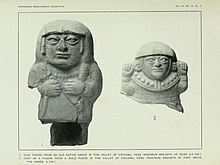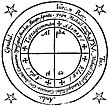
| Part of a series on |
| Anthropology of religion |
|---|
 |
| Social and cultural anthropology |
| Part of a series on |
| Magic |
|---|
 |
| Part of a series on the |
| Paranormal |
|---|
| Part of a series on |
| Esotericism |
|---|
 |
Divination (from Latin divinare 'to foresee, foretell, predict, prophesy, etc.')[2] is the attempt to gain insight into a question or situation by way of an occultic ritual or practice.[3] Using various methods throughout history, diviners ascertain their interpretations of how a querent should proceed by reading signs, events, or omens, or through alleged contact or interaction with supernatural agencies[4] such as spirits, gods, god-like-beings or the "will of the universe".[5]

Divination can be seen as an attempt to organize what appears to be random so that it provides insight into a problem or issue at hand.[6] Some instruments or practices of divination include Tarot-card reading, rune casting, tea-leaf reading, automatic writing, water scrying, and psychedelics like psilocybin mushrooms and DMT.[7] If a distinction is made between divination and fortune-telling, divination has a more formal or ritualistic element and often contains a more social character,[citation needed] usually in a religious context, as seen in traditional African medicine. Fortune-telling, on the other hand, is a more everyday practice for personal purposes. Particular divination methods vary by culture and religion.
In its functional relation to magic in general, divination can have a preliminary and investigative role:
[...] the diagnosis or prognosis achieved through divination is both temporarily and logically related to the manipulative, protective or alleviative function of magic rituals. In divination one finds the cause of an ailment or a potential danger, in magic one subsequently acts upon this knowledge.[8]
Divination has long attracted criticism. In the modern era, it has been dismissed by the scientific community and by skeptics as being superstitious; experiments do not support the idea that divination techniques can actually predict the future more reliably or precisely than would be possible without it.[9][10] In antiquity, divination came under attack from philosophers such as the Academic skeptic Cicero in De Divinatione (1st century BCE) and the Pyrrhonist Sextus Empiricus in Against the Astrologers (2nd century CE). The satirist Lucian (c. 125 – after 180) devoted an essay to Alexander the false prophet.[11]
- ^ "Anthropological Studies of Divination". anthropology.ac.uk.
- ^ "M. Tullius Cicero, Divination".
- ^ "Divination | Religion, History & Practices | Britannica". www.britannica.com. Retrieved 2023-10-28.
- ^ Silva (2016).
- ^ "Divination | Religion, History & Practices | Britannica". www.britannica.com. Retrieved 2023-10-28.
- ^ Morgan 2016, pp. 502–504.
- ^ "10 Basic Divination Methods to Try". Learn Religions. Retrieved 2023-10-28.
- ^ Sørensen, Jesper Frøkjær; Petersen, Anders Klostergaard (3 May 2021). "Manipulating the Divine - an Introduction". In Sørensen, Jesper; Petersen, Anders Klostergaard (eds.). Theoretical and Empirical Investigations of Divination and Magic: Manipulating the Divine. Volume 171 of Numen Book Series: Studies in the history of religions - ISSN 0169-8834. Leiden: Koninklijke Brill NV. p. 10. ISBN 9789004447585. Retrieved 9 December 2023.
- ^ Yau, Julianna. (2002). Witchcraft and Magic. In Michael Shermer. The Skeptic Encyclopedia of Pseudoscience. ABC-CLIO. pp. 278-282. ISBN 1-57607-654-7
- ^ Regal, Brian. (2009). Pseudoscience: A Critical Encyclopedia. Greenwood. p. 55. ISBN 978-0-313-35507-3
- ^ "Lucian of Samosata : Alexander the False Prophet". tertullian.org.